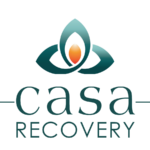
Therapeutic Yoga at Casa Recovery
Yoga is a spiritual practice that originated in India around 3000 B.C., according to archeological evidence. Westerners spent time practicing yoga in the East and brought their lessons back to the United States throughout the 19th and 20th centuries. Yoga caught on like wildfire from that point forward, as teachers and their studios popped up in almost every city across the country.
Yoga is a popular form of mindfulness-based practice and has many physical and mental benefits. Casa Recovery offers yoga as a holistic therapy for clients as part of our drug addiction and mental health programs.
Bring Balance Back to Life
Yoga traditionally has its roots in the principles and philosophies of the Indian religion of Hinduism. Although Western versions tend to emphasize its physical aspects and breathwork, the practice has maintained many of its spiritual elements such as its focus on mindfulness and meditation.
Yoga serves the purpose of bringing balance and health to multiple dimensions of the practitioner’s well-being, such as their physical, emotional, spiritual, and mental health. The term itself comes from the Sanskrit word meaning “yoking” or “joining” and describes a way to transform one’s consciousness.
Supporting Healthy Sleep Patterns
Clients recovering from addiction can experience a number of physical and psychological disturbances that make it difficult to get through treatment and succeed in recovery.
Yoga has been shown to ease many of these symptoms, such as insomnia. Substances can change the time it takes a person to fall asleep, the quality of their sleep, and the duration of sleep. More than just being tired, a poor night’s rest can exacerbate mental health problems and disrupt one’s metabolism and cognitive functioning.
Insomnia is an expected side effect of addiction because of the way drugs and alcohol disrupt the body’s sleep-wake cycle. Stimulants such as cocaine and methamphetamine are particularly prone to causing severe sleep deprivation. Hatha yoga and Nidra yoga, both of which focus on deep breathing, can be performed right before bed to ease into sleep.
Easing Symptoms of Mental Health Disorders
Long-term use of drugs and alcohol can trigger structural changes in the brain, as well as interfere with the production and activity of dopamine and serotonin. These neurotransmitters play a key role in the brain’s reward system and emotional regulation.
Dysregulation of these hormones can lead to the development of depression and anxiety disorders. Clients may feel like they’re on edge or like they can’t think straight. Some may be doubtful about their self-worth and their ability to stay clean. Mental health conditions are a common aspect of addiction and co-occur in about 50% of individuals suffering from addiction.
Yoga can improve mental health by reducing stress hormones like cortisol and inducing relaxation, as well as helping a person pay attention to the present moment by clearing their mind of negative thoughts and creating room for positive ones. Yoga also teaches gratitude and self-acceptance, helping a person appreciate the progress they have made in their recovery journey.
Promoting Activity & Healthy Eating Habits
After spending a long time neglecting themselves, individuals in addiction recovery can sometimes struggle with getting on track to a healthy lifestyle. Addiction limits a person’s ability to take care of themself. Physical exercise and healthy eating habits often just don’t matter when in active addiction. Adding yoga to a client’s recovery plan can help them develop healthy habits and get fit at the same time.
Yoga can improve flexibility, strength, and cardiovascular health. Studies also show that yoga can ease headaches and chronic pain of the lower back and neck. Physical active individuals tend to align their exercise regimens with healthy eating. Yoga may inspire clients to improve their eating habits through greater mindfulness and motivation for self-improvement.
Importantly, yoga is a social activity and many are a part of this active community. Practicing with others can build the social connections that many need to find hope and motivation in recovery.
Yoga Pairs Well With Other Holistic Therapies
At Casa Recovery, we believe that holistic therapies play an important role in helping our clients heal from addiction, as well as manage mental health symptoms they may be struggling with. This mindfulness-based practice connects the body and the mind in a way that many clients have never experienced before. Yoga can enhance one’s self-awareness, allowing an individual to readily identify and change harmful thought and behavioral patterns.
We offer other holistic therapies that clients can opt for, including:
Each of these therapies tackles addiction and mental health from a different angle, increasing a client’s likelihood of a successful recovery. Of course, evidence-based clinical and medical interventions are critical aspects of recovery, but holistic therapies round out treatment and fill in the gaps that traditional treatment modalities may miss. The mind, body, and spirit are intricately connected, and a deficiency in one area can throw everything off balance. These holistic therapies, including yoga, are available to clients in all of our treatment programs.
Yoga is an ancient practice that links the body to the mind and spirit. Yoga can bring balance and health to one’s physical, emotional, spiritual, and mental health. At Casa Recovery, we offer therapeutic yoga classes that aim to clear your mind and move your body in a gentle and relaxing way. We use holistic therapies, such as yoga, to help treat substance use and mental health disorders alongside other evidence-based treatments. Call us at (888) 928-2272

